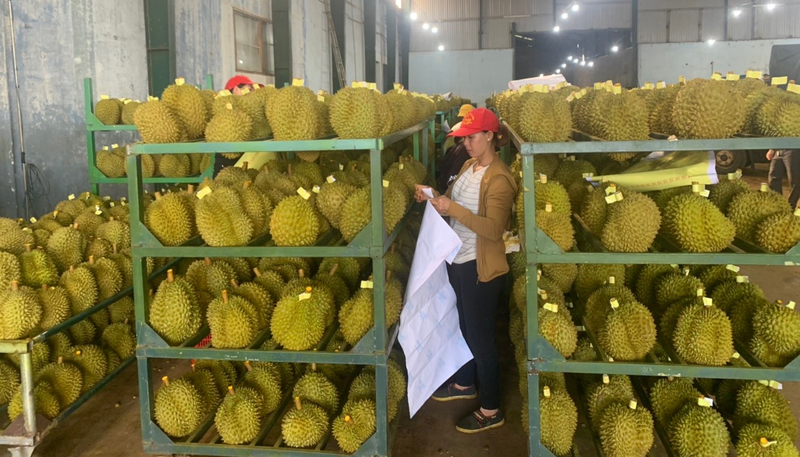Increases in both export volume and value
During the outbreak of the COVID-19 pandemic and China’s insistence on a Zero COVID policy, Phuong Ngoc Cai Be Limited Liability Company, based in Tien Giang province, still had orders to the Chinese market, but only one container of 20-30 tonnes of jackfruit allowed per day or one container of durian every three days.
However, since China reopened its border, orders have increased sharply. Director of Phuong Ngoc Cai Be Limited Liability Company Vo Tan Loi said: “The company’s orders have risen compared to the time during the COVID-19 pandemic. We have planned to order from growers to sell at full capacity, about 160-200 tonnes of durian and jackfruit per day.”
Similar to Phuong Ngoc Company, Hoa Cuong Fruit Import-Export Co., Ltd is also busy buying fruit to meet orders. Director of Hoa Cuong Fruit Import-Export Co., Ltd Nguyen Thi Ngoc Nhung said, the company’s export output has gradually become more stable thanks to the reopening of China. The company is purchasing about 1,500-2,500 tonnes of fruit per month to ship to China, much higher than before.
As Vietnam’s largest agricultural product importer, China currently imports nearly 10 billion USD of agricultural products from Vietnam each year. Particularly, vegetables and fruits shipped to China always account for more than 50% of Vietnam’s total vegetable and fruit export turnover. Immediately after this market opened, a series of major agricultural products from Vietnam were exported to China.
According to export businesses, the purchase of agricultural products shipped to China is increasing from 30% to 50%. Many businesses are planning to purchase agricultural products at their full capacity. It is expected that by the end of February, when the new season arrives, the procurement and export of agricultural products to China, will be much busier than at present.
In particular, the good news is that since this market opened, the prices of agricultural products such as dragon fruit, durian, and jackfruit, have soared significantly. Nguyen Quoc Trinh, Chairman of Long An Dragon Fruit Association said, after China opened its border on January 8, the price of dragon fruit rose very sharply, three times higher than during the pandemic. Currently, the price of dragon fruit in the garden ranges from 30,000-33,000 VND per kg, much higher than during the outbreak of the pandemic.
Not only dragon fruit, but the prices of durian also increased unprecedentedly to 190,000 VND per kg for monthong and 150,000 VND per kg for Ri 6 durian, in January and February. Meanwhile, the price of custard apple in the garden is 50,000-60,000 VND per kg and Thai jackfruit is 18,000-25,000 VND per kg.
General Secretary of the Vietnam Fruit and Vegetable Association Dang Phuc Nguyen assessed that Vietnamese agricultural products are being supported from many sides. After the visit of Party General Secretary Nguyen Phu Trong to China, in early November 2022, a series of fruit and vegetable export protocols were signed in favour of Vietnam. In particular, durian and jackfruit are the groups enjoying the earliest benefit.
China is currently a potential market, accounting for 19.2% of the export market structure of Vietnam’s agricultural, forestry and fishery products. According to Nguyen, this is the most expected market this year.
Towards sustainable export
It can be seen that the reopening of China has helped the price of agricultural products increase as the market gradually becomes active again. But according to experts, businesses should not be too hasty to return to the market without careful preparation, because China now has very new and quite strict regulations for imported goods.
Deputy Director of the Asia-Africa Market Department (Ministry of Industry and Trade) To Ngoc Son stated: “Currently, more than 90% of watermelons imported to China originate from Vietnam. However, because a protocol on this product has not been signed yet, the export value of this fruit is not commensurate with its potential.”
Over the years, China has perfected its legal system, through amendments to the Food Safety Law two times, while issuing Decree 248 and 249 in 2021, and Decree 259 in 2022.
At the same time, China has continuously strengthened law enforcement when it advocates bringing commercial activities into order and to strengthen supervision and the strict implementation of regulations. Therefore, not only increasing the value of exports, Vietnam needs to aim at sustainable exports and find ways to retain this important partner.
To promote the export of agricultural and aquatic products to this market of billions of people, To Ngoc Son recommended that localities and management agencies should build development strategies and build brands, in parallel with building production areas and concentrated, large-scale specialised farming areas, based on market signals.
For businesses, it is necessary to regularly update and comply with regulations on quality standards, testing, quarantine, packaging, and traceability of the Chinese market. Along with that, businesses must focus on branding and brand protection and carefully study the needs and development trends of the market.
Enterprises also need to build personnel who are fluent in the market and languages, take advantage of the Vietnam-China rail transport route and promote market exploitation through the form of e-commerce.
To Ngoc Son recommended that Vietnam has the geographical advantage of being close to China and needs to utilise this. Especially, on January 19, 2023, Kep Station in Lang Giang district, Bac Giang province, was granted permission by the Ministry of Transport to temporarily serve international intermodal operations. This will help reduce the load on Gia Lam Station, as well as help Vietnamese agricultural products penetrate deeper into the Chinese market.
















